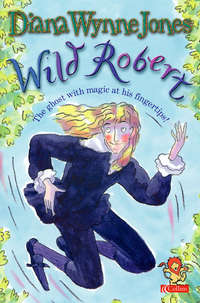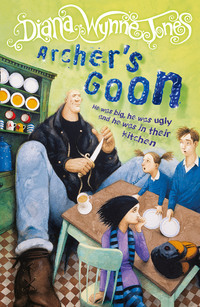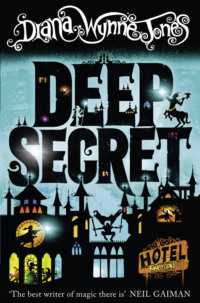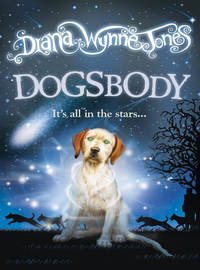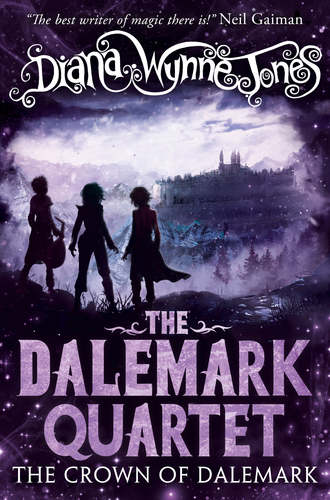
Полная версия
The Crown of Dalemark
“I think it is,” Rith said. He sounded awestruck. “Who found it? You or me?”
“You picked it up,” Mitt said. “I only stepped on it.”
Rith turned the dripping statuette round again. “I wish I could be sure— Look, may I keep it for now and give you your share when I’ve got it?”
If Mitt had not been so saddle-sore, he might have argued. But the cold water was smarting him like acid, and he could think of almost nothing else. “Fine,” he gasped, and splashed his way across to the far bank, where the horses were standing head to tail, looking pleased with themselves. Rith followed, stowing the wet figurine in the front of his jacket.
“You’re being very generous,” he said several times, as they mounted and rode on. “You really mean I can keep it for now?” He was evidently feeling a strange mixture of doubt and elation, but then anyone would, Mitt thought, who had just picked up a pound of solid gold. He thought Rith was nice to be so bothered about it. All through the next hour or so Rith was either exclaiming at the amazing chance that had led them to that spot or asking Mitt if he really minded waiting for his share. “If it hadn’t been for that landslide,” he said, “we’d never have come this way. Look, are you really sure?”
Mitt got increasingly gruff with him. Mitt’s leathers were wet through and rubbing his soreness until he was convinced he was being flayed. Besides, he thought angrily, the way he was caught in the earls’ plotting, he couldn’t see himself having much use for gold or anything else shortly. He wished Rith would shut up. By the late afternoon, when the sea came into view again blue and crisp to northwards, Mitt was wanting to scream at Rith – and he might have done had they not come out on a headland overlooking Adenmouth to find themselves looking down on an accident.
A Singer’s cart had overturned on the bridge below. The bridge had no sides, and the horse that had pulled the cart was dangling struggling in the Aden. Mitt saw someone pulling uselessly at the horse. A girl lay on the bank as if she might be dead.
“Come on!” shouted Rith, and his shaggy horse was off down the hill as if it was aiming to end in the river too.
Mitt followed as fast as the Countess-horse would let him, which was not very fast. The hill was extremely steep. Even Rith slowed down halfway, but this was probably because he could see that help was on its way. They could see into a long green valley to one side, where a party of people were running from one of the farms. More people were running across a second bridge, from Adenmouth itself, and a horseman was galloping ahead of them.
Everyone converged on the bridge, but the horseman got there first. He was a hearthman in Adenmouth livery. As the Countess-horse slithered cautiously down the last slope, Mitt saw the horseman leap to the ground, thrust his reins into the hands of the red-headed Singer’s boy, and run towards the struggling horse. There he took one look, cocked his pistol, and shot the horse through the head.
Mitt and Rith came down to the bridge while the horse was still jerking. The bang rang in Mitt’s ears like the memory of his worst dreams. The white staring face of the Singer-boy looked just like he felt.
“Anything we can do?” called Rith.
The hearthman turned from slashing at the traces that held the dead horse. Mitt almost laughed. It was Navis. It would be. “Hello,” he said.
Navis nodded at him in his cool way. “You see to that girl,” he said to Rith. “I think she’s alive. Mitt, you help me cut this horse loose.”
As the two of them dismounted, Mitt noticed the Singer himself wandering about on the bank, carefully laying out musical instruments from the overturned cart. A dreamy-looking fellow with a grey beard. Mitt ignored the Singer as useless and hobbled over to Navis, while Rith sprinted to where the Singer-girl was sitting up, holding her head.
“Get your knife out and cut here, then here,” Navis said. He did not seem in the least surprised at seeing Mitt there. His attention was mostly on the accusing yellow-white face of the Singer-boy. “Your horse had broken two legs – look,” he said to the boy. “There was nothing else to be done.”
“He was blind in one eye,” the boy said. “He walked off the bridge.”
“I just wish mine would do that too!” Mitt said, to make him feel better. “Mine’s a right brute.”
The boy simply stared at him. “Southerner,” he said. “You both are.” He turned his back and led Navis’s mare to the other side of the road.
Navis glanced at Mitt. “There’s a lot of prejudice,” he said. “Now cut here.” Mitt slashed away angrily. Cool, cool Navis. He had forgotten just how cool.
By the time they had cut the horse loose, the people from the farm and the town had arrived. There was a lot of typically Northern milling about and talking. The chief talker was a lad from the farm, who wanted everyone to know how quickly he had gone for help to the mansion and what the lady Eltruda had said to him. But amid all this there was unnoticed efficiency. In less than a minute many hands had heaved the neat green cart upright and Mitt was able to read the gold lettering on its side.
“Hestefan the Singer.”
“You want me?” Hestefan asked.
He was standing beside Mitt with a cwidder in one hand and a fife in the other. Mitt was embarrassed. He had only said it aloud because he still found it easier to read that way. Now he felt he had to say something. “How did you get past the landslip on the road?” he asked.
“Landslip?” said Hestefan. “What landslip?”
Mitt gave him up again and turned to Rith, who said in a worried whisper, “I think that girl, Fenna, has really hurt her head. Can you help me get her on a horse?”
The Countess-horse was at that moment demonstrating that it was not carriage-trained. They had tried to back it into the shafts of the cart, where it divided its attention between trying to take bites out of anyone near and attempts to kick the splashboard in. Mitt ran and hauled it clear. “You good-for-nothing Countess, you!” He dragged it over to the injured girl, where the Singer-boy held it while Mitt and Rith heaved Fenna into its saddle. The chattering crowd seized Rith’s horse and backed that into the cart instead. Nobody thought of using the beautiful mare that belonged to Navis. Typical of Navis, that, Mitt thought, taking the reins from the boy. The lad looked as ill as Fenna. “Want me to boost you up behind her, Moril?” Mitt asked. He had gathered the boy’s name was Moril.
Moril simply turned away and walked to the cart.
“All right. Be like that then!” Mitt said to his back. All this running about made his backside feel as if it was on fire. It got worse when he set off leading the horse into Adenmouth. Fenna had to nudge him with her foot before Mitt noticed she was trying to speak to him.
“Er – young hearthman. Sir.”
Mitt looked up. She was pale, but she was dark and pretty, and she spoke with just a trace of a Southern accent, which made him try to smile at her. “Sorry. What?”
“Don’t think too hard of Moril, sir,” Fenna said. “He loved our old horse. And I heard tell he had another horse killed by Southerners last year.”
Well, he’s no call to take it out on me! Mitt thought. But he said politely, “Heard tell? I thought he was your brother.”
“Oh no, sir,” Fenna said. “Moril is Clennen the Singer’s son. He’ll be a great Singer himself before long.”
Rith grinned at Mitt round the nose of the Countess-horse. “These artists! You can tell what they’re like from the red hair. Sit straight, Fenna, or you’ll fall off.”
It was not far to Adenmouth, just across another bend in the Aden, which then poured noisily past low grey houses crowded at the edge of a cove. Mitt was glad. By the time they had gone up the main street to the mansion, he was not sure he could have walked another step. Their arrival caused much confusion, for a good hundred more people came out of the houses to see what was wrong and then followed them into the courtyard of the mansion, where rows of trestle tables that had been set up for the Midsummer Feast all had to be moved to make way for the cart.
Lady Eltruda was out on the hall steps, bellowing instructions in a voice like the Armsmaster’s. “Navis!” she yelled. “Get that thing through to the stables! Spannet, fetch the lawman! You!” she screamed at Mitt. “You in the Aberath livery! Bring that poor girl to me!”
Before Mitt could move, Rith was dragging Fenna and the Countess-horse towards the steps, zigzagging between tables and shouting back. “Aunt! Aunt! I’m here! I got here, and I got my sign!”
At this Lady Eltruda dashed down the steps, yelling, “Noreth, my dove! Noreth!” and flung her arms round Rith.
Mitt stared. He felt terrible.

THE CONFUSION CLEARED up surprisingly quickly. Mitt was almost alone in the yard, wondering what on earth to do now, when Navis put a hand on his shoulder.
“Come to my room,” he said. “Tell me your news there.”
Funny, Mitt thought, staring slightly downwards into Navis’s cool, clear-cut face. I don’t remember him being that small. Maybe I grew. “I would if I could walk,” he said.
Navis smiled a little. “It’s not far. But I can’t carry you.”
He turned and led the way. Mitt hobbled after him, protesting, “I do know how to ride! It’s just that I never did it for a whole day before!” They went through the hall, big enough, but a dark little place compared with the one at Aberath, and up a shallow flight of steps. Navis had a comfortable panelled room beyond, as good as one of Alk’s. Typical, Mitt thought, looking round. He must be well in with Lord Stair. “How did you know I got news?”
“Hush a moment,” Navis said. Two serving-men came into the room. They were grinning rather and carrying a large bowl of something sour and strong. They dumped it where Navis pointed and then hung about, lingeringly, as if there was some joke. “Thank you,” Navis said, “but we’d like to be private now.”
“What is this?” Mitt said suspiciously as the men left, still grinning.
“Vinegar,” said Navis. “Take your leathers off and sit in it. Go on. It works.”
Slowly, with misgivings, Mitt did as Navis said. He sat. Yelled. Tried to get out again and found himself held down by Navis’s unexpectedly strong hand. Vinegar spilt on the rugs, and Mitt went on yelling, even though he was sure the two men were standing outside the door loving every shriek. “Flaming Ammet!” he roared. “Are you trying to kill me?”
“No,” said Navis, and he went on holding Mitt down until Mitt’s yells had given way to gasps and then to miserable panting. Then he let go and went to the half-open door. “That will be all,” he said, and closed the door.
Mitt heard footsteps retreating. “Can I get out now?”
“The longer you stay in, the sooner you’ll be able to ride again,” Navis said. “Tell me your news to take your mind off it.” It was on the tip of Mitt’s tongue to tell Navis he was as bad as Earl Keril, but he did not say it because he suddenly realised it was true. Navis, in his way, could be quite as ruthless as Keril. Earls’ blood will out! Mitt thought. He was wondering if he was going to be able to tell Navis anything after all when Navis added, “They wouldn’t have let you leave Aberath without very good reason, I’m sure.” Very strong bitterness came through his coolness.
He feels just as caught as I do! Mitt thought. “Well, before I start, do you know where Hildy is?”
“In Gardale,” said Navis. “Though, from the one letter she deigned to send, I wondered if she wasn’t in the moon.”
“I got one of those,” Mitt said. “Total gibberish. And Ynen? You have any idea where Ynen is?”
“No,” said Navis. There was a cold little silence before Navis said, “No. No one has bothered to tell me that. Is that why they let you see me? To bring me a threat?”
“That may be part of it,” Mitt said. “They must have reckoned I’d tell you. Navis, they want me to kill that girl Noreth. And I tell you I rode most of the way here with her and she’s no madder than what I am!”
“Sit still,” said Navis. “You’ll get vinegar everywhere.” He drew up a chair and sat facing Mitt in his bowl. “Tell me this carefully. Who wants you to?”
“The Countess and Earl Keril,” said Mitt. “Talk about your past catching up with you! They found out all about me.”
“Keril,” said Navis. “Keril. Then, Mitt, you are not the only one whose past has caught up with him. I once risked a good deal to send a message to Keril to warn him that his sons were prisoners in Holand. He must have taken it as a threat. What did he say?”
Mitt sat in his bowl and told Navis everything, including his ride with Noreth. The only thing he left out was the way he had thought the Aden was a mighty river. He was not sure he believed that himself now. He found he felt a little tearful as he talked, not for obvious reasons but because Navis was listening and not treating him as the scum of the earth.
“That statue,” Navis said. “You were a little overgenerous there. Can you persuade her to give you your half?”
“Chop it in two? Why?” said Mitt.
“Because if it is solid gold,” said Navis, “neither of us need depend on the charity of earls. We could leave tonight. Mitt, I don’t like this at all. You hear a great deal about Noreth here in Adenmouth. She is much loved. If anything happened to her, there would be an outcry all down the coast dales as far as Kinghaven. You are an obvious Southerner. Yet they send you after her in full Aberath livery. What are they playing at? Everyone will know Aberath had a hand in it, however villainous they say you are.”
“I’m not doing it,” said Mitt. “I can’t. That’s final. But what do we do?”
“We leave,” said Navis, “as soon as I think of an excuse, with your share of the gold if possible. We look for Ynen and we cut short Hildrida’s education and we hope we can get to them before Keril finds out.” He sighed. “Then we all go into hiding again. Meanwhile, keep sitting. You have to be able to ride.”
Mitt sat for another hour. During that time the big panelled room darkened, and drops of rain patterned on the tall window. Lady Eltruda’s voice was heard bawling for Navis to see about awnings over the yard. Navis hurried away. He came back only to be called away to see about candles. By the time he was back from that, the clouds had passed and red-gold sunlight was slanting into the room. Lady Eltruda bawled that it was going to be fine after all, and Navis hurried off to have the awnings rolled away. Mitt saw why Navis seemed so well in with Lord Stair. People welcomed a little Southern efficiency round here. He grinned as he watched Navis come back and dress for the feast, with the same efficiency, in a ruffled shirt and blue-green Adenmouth livery. You wouldn’t think, to look at him, that Navis must have been dressed by a valet all his life until these last months.
“You can get out now and wash,” Navis said.
Mitt did so. He was not sore any more, not even tender. In fact, he was as smooth and leathery as his own buff and gold Aberath livery. “You pickled me!” he said.
“That was the idea,” said Navis.
They went out into the hall, which was full of cooking scents and people standing about waiting for Lord Stair to arrive and start the feast. The big doors were open, blowing in a chilly wind. A lot of noise came from the yard, where everyone else in Adenmouth was gathered at the tables drinking beer until the food arrived. Mitt stood, a little lost among all these strangers.
“Oh, there you are, Mitt!” said Rith’s voice.
Mitt turned and found himself facing an elegant lady. He was utterly dismayed. The only thing that was the same about her was the longish, freckled face with its eager, cheerful look. But that was surrounded by clouds of fair, frizzy hair, done in a most fashionable style, and she had on a slender dress of grey-blue that hung in sheeny folds round a thoroughly female figure. Mitt could see now she was a lot older than he was – eighteen or twenty at least – and that was enough to make him feel a fool. But the thing that dismayed him most was the fact that Noreth was alive, utterly alive, and warm, and a person.
“Come on!” said Noreth. “Where’s your tongue?”
“Er,” said Mitt. “Your ladyship—”
“I told you,” she said, “to call me Rith.”
“Yes,” said Mitt, “but … what were you doing, letting on you were a boy?”
“I always travel like that,” Noreth said. “It’s far quicker and safer than a carriage, and I don’t need to bother to take a guard. My cousin lends me the livery. And I can use the weapons too. You learn to, during grittling. But listen—” To Mitt’s consternation, Noreth reached out and took hold of both his hands. Her hands were strong and warm, but so small they made Mitt’s feel like great cold paws. “I’m very nervous,” she said. She was. Mitt could feel her hands trembling. “There’s something I have to do. Do you know how it feels to do something that means your life will never be the same again?”
“Don’t I just!” Mitt said. He sensed that Navis had come up behind him and was watching Noreth coolly. That reminded him that he had to ask for his share in the statue, but he was too confused to know how to put it.
“I had a feeling you did,” said Noreth. “Listen, could you—” There was a bustle up on the dais. Someone was calling for lamps to be lighted. Noreth looked round. “Oh, here comes my uncle,” she said. “Drunk as usual. I must go. If you could just bear witness about that statue when the time comes?”
“Sure,” said Mitt, “but—”
Noreth let go of him and hurried away. Everyone was surging towards the long tables to sit down. Navis beckoned Mitt to a place beside him, just below the important table on the dais. Mitt found there were advantages to being sent to Adenmouth after all. At Aberath he would have been waiting at the tables with the other boys. Here he was a guest, and he could sit and let boys wait on him. He settled down to enjoy himself. The food was good, though Mitt found he did not much care for the traditional Midsummer sausage. Like so much of the food in the North, it seemed to be mostly oatmeal. But there was venison and pork and chicken and beef as well, oyster patties and plum-and-mutton pies, strawberries, raspberries with syllabub, and sweet soda bread. Ale and spirits were passed round the whole time. The sound of voices became a cheerful roar that almost drowned the even greater din from the yard outside. Mitt ate hugely and became very friendly with the hearthmen at his table. There were a great many jokes about vinegar.
Lord Stair was indeed drunk. It was impossible not to notice. He was a large, sallow man, and he sat sprawling in his chair, eating very little and shouting for more drink. Every so often he complained loudly about the food. Nobody took much notice. If people needed to have orders about anything, they asked Lady Eltruda. It looked as if Lady Eltruda, short and fat and loud as she was, had the same power here that the Countess had in Aberath.
“Indeed she does,” Navis told Mitt. “I owe my position here to Eltruda. I imagine Noreth does too.”
Lady Eltruda was obviously very fond of Noreth. She kept smiling at her proudly.
The feast drew to a close in sweet cream cheeses and sugared fruit, which Mitt was too full to touch. Lord Stair began to get impatient. His voice roared something about “those idle flaming Singers!” and there were terrific clatterings and scrapings from the yard, where the tables were being moved aside. Hestefan got up from a table near the end of the hall and went to stand in the great doorway. With him, to Mitt’s surprise, came Fenna and Moril.
Navis frowned. “I don’t think that girl should be here. Nor the boy. They both look ill to me. But I suppose they have to earn their keep.”
His voice was nearly drowned in cheering and clapping. Nobody else cared two hoots how the Singers felt, for there was going to be dancing. Tables were pushed aside in the hall too. Hestefan slung a narrow drum round his neck, looked to see if Fenna was ready on the portable organ and that Moril had tuned his cwidder, and struck up a strenuous jig. Outside and inside, everyone grabbed a partner and danced.
The dancing went on and on. Mitt at first leant against a table, feeling a little out of things and watching Navis being whirled about by Lady Eltruda. But at the next tune he was grabbed by a young lady in scarlet ribbons, and from then on he danced with the rest. The hall whirled around him, hot and riotous. He kept catching glimpses of Navis dancing with Lady Eltruda, which bothered him slightly, since Lord Stair simply sprawled in a chair and went on drinking. But once or twice he saw Navis dancing with Noreth, in a very courtly way. Mitt would not have dared to dance with Noreth himself. He knew absolutely none of the dances. The young ladies squealed with laughter and pushed him into the right places, and he kept going wrong. Every time his desperate, ignorant caperings got him into a real mess, he seemed to catch the eye of Moril, tirelessly playing his cwidder in the doorway, and there was malicious amusement in Moril’s look. It began to annoy Mitt.
It took Mitt unawares when the Singers suddenly changed to a slow, haunting tune and everyone stopped dancing. For a moment Mitt was the only one capering. Moril grinned. “What’s this tune, then?” Mitt gasped.
“Undying at Midsummer, of course,” said the girl in scarlet ribbons. “It’s nearly midnight.”
Around him dancing partners were breaking apart and the servers were going round with bottles of rare white wine, Southern wine, to welcome midnight with. Someone put three mugs of it down on the steps for the Singers.
Navis bent over his mug, sniffing deeply. “Now this I have missed,” he said to Mitt. “Grapes don’t ripen this far North.”
They exchanged a little smile of pride in the South, even though it had turned them both out. Mitt said wonderingly, “That can’t be the only thing you miss!”
“I think it is,” said Navis. “Life’s never dull up here.” Saying this, he thrust his mug into Mitt’s free hand and dived towards the doorway. He was just in time to catch Fenna as she dropped the heavy organ and passed out. Everybody stared in shock as Navis turned to Hestefan with Fenna draped over his arms. “What were you thinking of, letting this girl play tonight? Couldn’t you see she was ill?”
Hestefan gave him a slow, worried look. “She swore she was well, sir, and we needed her part on the organ. I thank you for catching her so quickly.”
Navis looked at Moril. “And you? Are you quite well?”
Moril’s face did not have much expression, but Mitt could tell that he would not have admitted it to Navis even if he had been playing with all ten fingers broken. “Perfectly, thank you,” Moril said.
Here Lady Eltruda raised her voice. Two women came and took Fenna quickly away. Someone shoved the heavy little organ to the side of the doorway. It was almost midnight. A running crowd of men and women were carrying every lamp and candle in the place and putting them down on the ground in two long lines leading from the gates of the yard, through the yard, up the steps and into a circle in the middle of the hall. It was good luck to place a candle, so everyone fought for the honour except for Lord Stair – and Mitt and Navis, who did not know the custom.
“Let in the Undying!” everyone shouted as the last candle was put in place.
Silence fell, expectantly. From the yard came a strong grating sound as the two big gates were pushed open. At Hestefan’s nod, Moril again played the slow, haunting chords of Undying at Midsummer. To Mitt’s ears he seemed to be playing now in an odd, different way. At any rate, there was a queer humming building under the notes. A damp breeze blew in from the yard, where it was probably raining again, bending all the candle flames. A great wavering shadow advanced across the floor and grew up the wall beyond.


